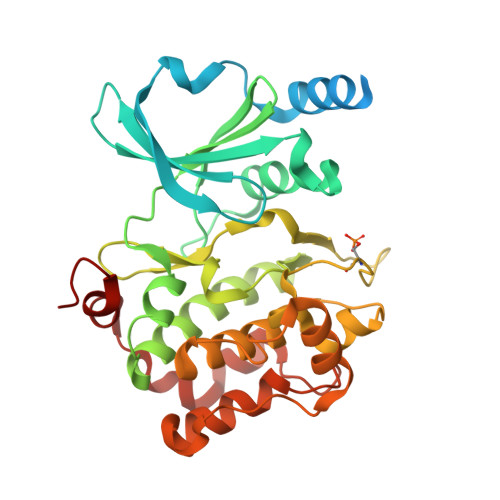Type II p21-activated kinases (PAKs) are regulated by an autoinhibitory pseudosubstrate.
Ha, B.H., Davis, M.J., Chen, C., Lou, H.J., Gao, J., Zhang, R., Krauthammer, M., Halaban, R., Schlessinger, J., Turk, B.E., Boggon, T.J.(2012) Proc Natl Acad Sci U S A 109: 16107-16112
- PubMed: 22988085
- DOI: https://doi.org/10.1073/pnas.1214447109
- Primary Citation of Related Structures:
4FIE, 4FIF, 4FIG, 4FIH, 4FII, 4FIJ - PubMed Abstract:
The type II p21-activated kinases (PAKs) are key effectors of RHO-family GTPases involved in cell motility, survival, and proliferation. Using a structure-guided approach, we discovered that type II PAKs are regulated by an N-terminal autoinhibitory pseudosubstrate motif centered on a critical proline residue, and that this regulation occurs independently of activation loop phosphorylation. We determined six X-ray crystal structures of either full-length PAK4 or its catalytic domain, that demonstrate the molecular basis for pseudosubstrate binding to the active state with phosphorylated activation loop. We show that full-length PAK4 is constitutively autoinhibited, but mutation of the pseudosubstrate releases this inhibition and causes increased phosphorylation of the apoptotic regulation protein Bcl-2/Bcl-X(L) antagonist causing cell death and cellular morphological changes. We also find that PAK6 is regulated by the pseudosubstrate region, indicating a common type II PAK autoregulatory mechanism. Finally, we find Src SH3, but not β-PIX SH3, can activate PAK4. We provide a unique understanding for type II PAK regulation.
- Department of Pharmacology, Yale University School of Medicine, New Haven, CT 06520, USA.
Organizational Affiliation:


















